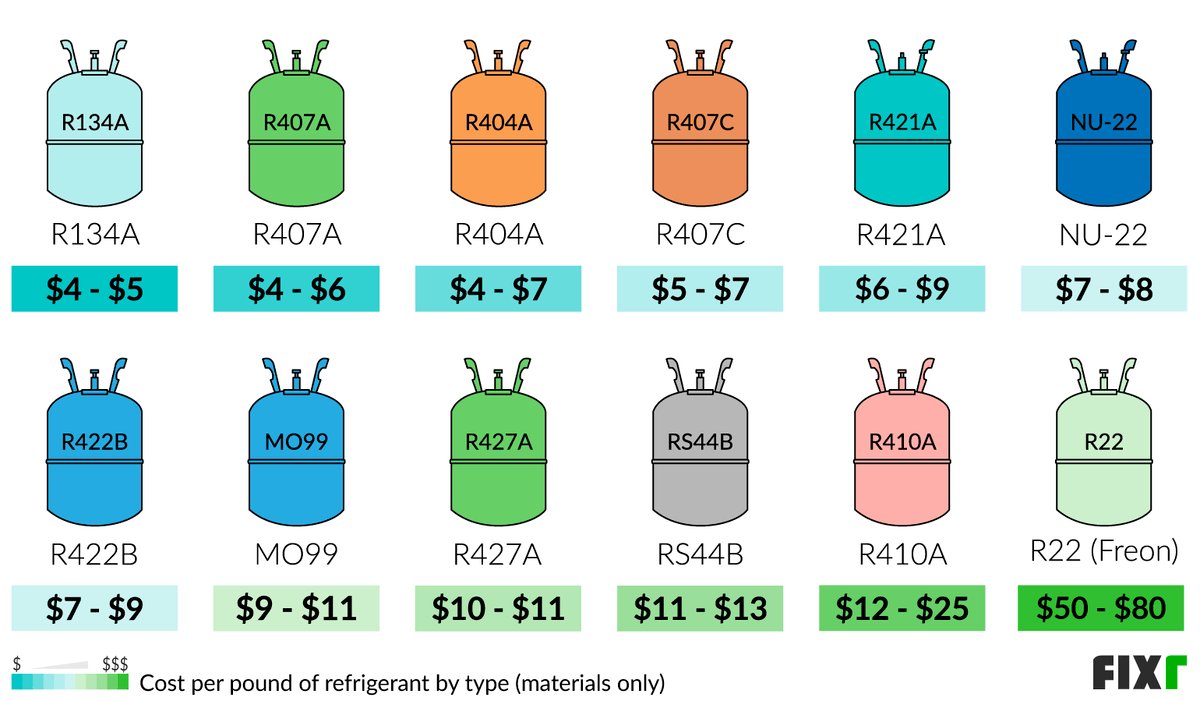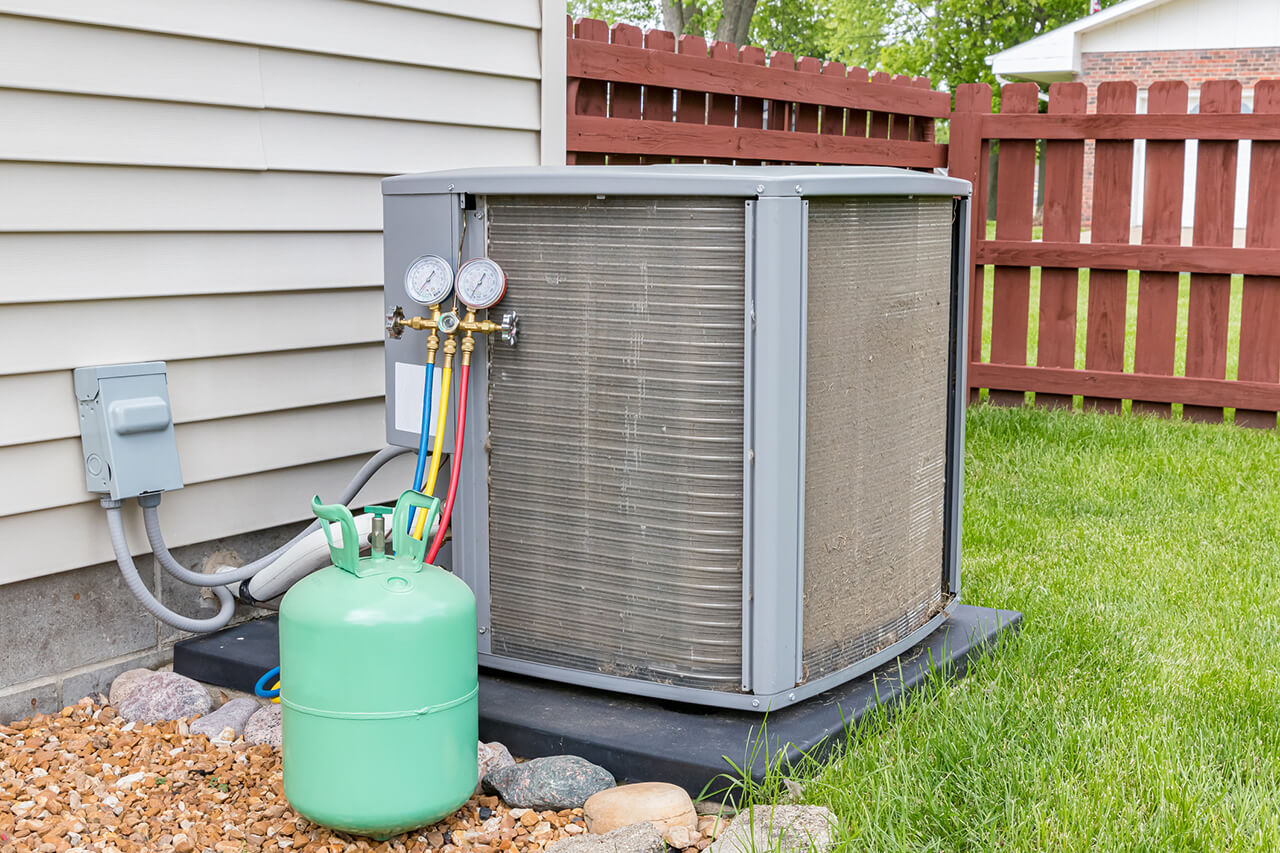Cost Of Freon For Home Ac

Air conditioning systems keep our homes comfortable, but they rely on a crucial component: refrigerant, often referred to by the brand name "Freon" (though this term is technically specific to older refrigerants). Understanding the cost of refrigerant is important for maintaining your AC and avoiding unexpected expenses. This guide provides a comprehensive overview of factors influencing refrigerant costs for home AC units.
What is Refrigerant and Why is it Important?
Think of refrigerant as the "blood" of your AC system. It's a chemical substance that cycles through your AC unit, absorbing heat from inside your home and releasing it outside. This process is what cools the air. Without refrigerant, your AC simply wouldn't function.
Refrigerants exist in various types, each with its own properties and environmental impact. Older systems often used R-22 (often called Freon), which is now being phased out due to its ozone-depleting potential. Newer systems utilize more environmentally friendly refrigerants like R-410A (Puron) or even newer alternatives.
Important Note: Only certified technicians can handle refrigerant. It's illegal and dangerous for untrained individuals to attempt to add or handle refrigerant. Refrigerant leaks also pose an environmental hazard.
Factors Affecting the Cost of Refrigerant
Several factors influence the cost of refrigerant for your home AC, making it difficult to provide a single, definitive price. Understanding these factors will help you get a more accurate estimate.
1. Type of Refrigerant
The type of refrigerant used in your AC is the most significant cost driver. As mentioned earlier, older refrigerants like R-22 are being phased out, making them scarcer and more expensive. Newer, more environmentally friendly refrigerants like R-410A are generally less expensive, but their price can still fluctuate.
Here's a general overview of refrigerant types and their relative costs:
- R-22 (Freon): Most expensive due to its phase-out. Supply is limited, and demand can be high in older systems.
- R-410A (Puron): Moderately expensive. The standard refrigerant in most newer AC systems, but costs can vary based on supply and demand.
- Newer Alternatives (e.g., R-32): Potentially less expensive in the long run, but availability may be limited initially, and system modifications may be needed.
2. Quantity of Refrigerant Needed
The amount of refrigerant required to recharge your system will directly impact the cost. Larger AC units and systems with more extensive leaks will naturally require more refrigerant.
The amount of refrigerant needed is typically measured in pounds. Your AC unit should have a sticker indicating the type and amount of refrigerant it requires. A technician will use this information to determine how much refrigerant to add during a recharge.
3. Labor Costs
Recharging an AC system with refrigerant is not a DIY job. You'll need to hire a qualified and licensed HVAC technician. Labor costs can vary significantly depending on your location, the technician's experience, and the complexity of the job.
Labor costs typically include:
- Diagnostic Fee: The cost to diagnose the cause of the refrigerant leak and assess the overall system.
- Leak Repair (if necessary): Addressing the source of the refrigerant leak before recharging the system.
- Refrigerant Recharge: Adding the appropriate amount of refrigerant to the system.
- System Testing: Ensuring the system is functioning correctly after the recharge.
4. Leak Repair Costs
In most cases, a refrigerant leak is the reason for needing a recharge. Simply adding refrigerant without fixing the leak is a temporary solution and will lead to repeated problems and further expenses. Repairing the leak is crucial for long-term AC performance and cost savings.
The cost of leak repair can vary widely depending on the location and severity of the leak. Minor leaks might be relatively inexpensive to repair, while more significant leaks in hard-to-reach areas can be more costly.
5. Location
Your geographic location can influence refrigerant costs. Areas with higher living costs and higher demand for HVAC services tend to have higher labor rates and potentially higher refrigerant prices.
6. Season
The time of year can also impact refrigerant prices and labor costs. During peak seasons (summer), when demand for AC services is high, technicians may be busier, and prices may be slightly higher.
Estimating the Cost of Freon Recharge
Providing an exact price for a Freon recharge is difficult without knowing the specific details of your AC system and the extent of the problem. However, here's a general cost range to give you an idea:
- R-22 Recharge: Expect to pay $200 - $400+ per pound, plus labor costs. Due to the phase-out, R-22 is significantly more expensive. In some cases, it might be more cost-effective to replace the entire AC system if it uses R-22 and has a major leak.
- R-410A Recharge: Expect to pay $100 - $300 per pound, plus labor costs. The price can vary depending on market conditions.
- Labor Costs: Expect to pay $75 - $200+ per hour for labor. This can vary based on location and the complexity of the job. The diagnostic fee can range from $50 - $150 or more.
Example Scenario: Let's say your AC unit uses R-410A and needs 2 pounds of refrigerant. The refrigerant cost might be $200 - $600 (2 pounds x $100-$300/pound). Add in the labor costs (diagnostic fee + recharge labor), and the total cost could range from $400 to $1000 or more.
Important Considerations:
- These are just estimates. Always get a detailed quote from a qualified HVAC technician.
- The quote should clearly outline the cost of refrigerant, labor, and any necessary repairs.
- Ask about the technician's experience and certifications.
- Don't be afraid to get multiple quotes to compare prices.
Is it Worth Recharging My AC?
Deciding whether to recharge your AC or replace it depends on several factors:
- Age of the System: If your AC is more than 10-15 years old, it might be nearing the end of its lifespan. Replacing it with a newer, more energy-efficient model might be a better long-term investment.
- Type of Refrigerant: If your system uses R-22 and requires a significant recharge, the cost might be prohibitive. Consider replacing the system with one that uses R-410A or a newer alternative.
- Extent of the Leak: If the leak is significant and difficult to repair, the cost of repair plus recharge might exceed the value of the system.
- Energy Efficiency: Older AC systems are often less energy-efficient than newer models. Replacing your system can lead to significant energy savings over time.
A qualified HVAC technician can assess your situation and provide recommendations based on your specific needs and budget.
Preventing Refrigerant Leaks
Preventing refrigerant leaks is the best way to avoid costly recharges and extend the life of your AC system. Here are some tips:
- Regular Maintenance: Schedule regular maintenance appointments with a qualified HVAC technician. They can inspect your system for leaks and other potential problems.
- Clean Air Filters: Clogged air filters can put a strain on your AC system, potentially leading to leaks. Replace your air filters regularly (every 1-3 months).
- Avoid Overworking Your AC: Don't set your thermostat too low. This can overwork your AC and increase the risk of leaks.
- Trim Vegetation Around the Outdoor Unit: Keep vegetation trimmed back from the outdoor unit to ensure proper airflow.
- Promptly Address Issues: If you notice any signs of a problem (e.g., reduced cooling, unusual noises), contact a qualified HVAC technician immediately.
In Conclusion
The cost of refrigerant for your home AC can vary significantly based on several factors, including the type of refrigerant, the amount needed, labor costs, and the location of the leak. Understanding these factors will help you get a more accurate estimate and make an informed decision about whether to recharge or replace your AC system. Remember to always hire a qualified and licensed HVAC technician for any refrigerant-related work.










